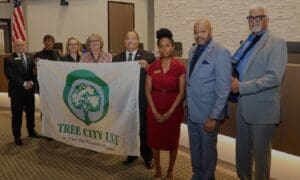The idea is to lower the fees for sewer hook-ups to make Fayetteville more financially attractive for development and re-development projects. The Fayetteville City Council on June 7 heard the first reading of a proposal that would significantly lower those fees.
City Assistant Director of Finance and Administration Ellen Walls in a presentation on the proposal said the current fee schedules are not easily interpreted by builders and developers and are cumbersome for staff to administer and maintain. The desire in developing new fee schedules is to enhance and encourage new development as well as re-development in the city, especially during these challenging times.
The proposal carries a significant decrease in the current fees charged for sewer hook-ups. Citing several examples, Walls said the standard residential fee for a three-quarter-inch meter currently totaling $1,576.80 would decrease by more than $98 to $1,478.50 while a daycare center with a 1.5-inch meter would go from the current $8,721.80 to $4,928.50, a decrease of $3,793.45.
Another example cited small and large restaurants. A restaurant with 22 seats and a three-quarter-inch meter carries a current fee of $6,298. The proposed fee decreases to $1,478.50, a difference of $5,499.50. A larger restaurant with 90 seats and a two-inch meter carries a current fee of $25,767. The proposed fee would be $7,8858.35, a decrease of $17,881.65.
Yet another example dealt with the conversion of a small retail space to a 10-seat restaurant. The current fee is $2,970.80 but the proposal would carry no fee whatsoever.
Along with setting the fees lower to help spur development or additional uses, the idea behind the reductions, said Walls, is to make the fee structure more easily understood by the building and development community, the city’s businesses and residents. If approved, the new fee structure can be easily and uniformly applied by city staff. Beyond that, the fees would represent one-time charges that do not require re-calculation and additional charges as land uses changed, Walls said.
The council is expected to hear the second reading at the June 21 meeting.












Leave a Comment
You must be logged in to post a comment.